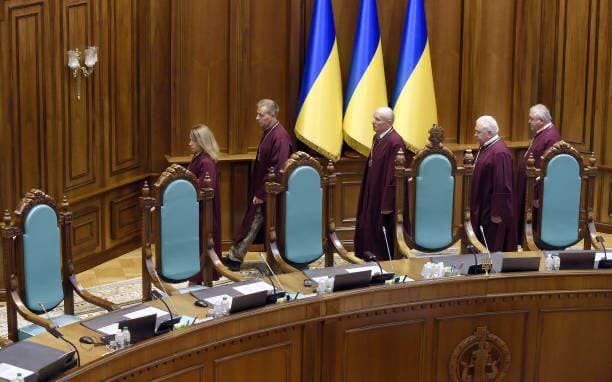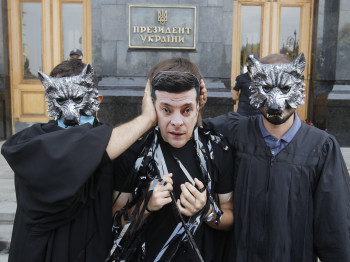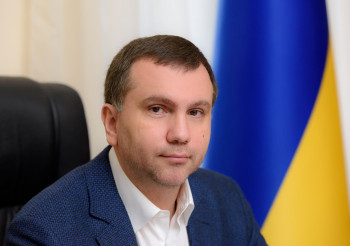Zelensky signs judicial bill that may block European integration, undermine Western support

President Volodymyr Zelensky on Dec. 20 signed into law a bill on the Constitutional Court that may derail Ukraine’s European integration.
The bill regulates the selection of Constitutional Court judges.
It has been criticized by Ukraine’s civil society and the West because it fails to give foreign experts a crucial role in assessing the integrity of candidates for Constitutional Court jobs. As a result, the President's Office will be able to handpick loyalists and fully control the Constitutional Court, according to legal experts and anti-corruption activists.
The President's Office did not respond to a request for comment.
The law may also hinder Ukraine’s negotiations on joining the European Union. The reform of the Constitutional Court is the first of the seven recommendations outlined by the European Commission as conditions for Ukraine's accession to the EU.
Mykhailo Zhernakov, head of the legal think-tank Dejure, argued that the signing of the bill undermines Ukraine’s efforts to get aid, including money and weapons, from the West amid Russia’s aggression.
“Even among EU countries, the support for Ukraine is not automatic or unanimous,” he said on Facebook. “Getting it involves fantastic efforts, including those by Zelensky and his office…(But) the authorities and Zelensky personally have ignored a key recommendation on reform No. 1 as part of European integration.”
Ukraine's dysfunctional Constitutional Court has been involved in many corruption scandals and controversies. Ukraine's Western partners and Ukrainian NGOs have called for reforming the institution and replacing discredited judges with independent and honest ones.
read also

Criticism of the law
Under the law, a panel of experts will be able to approve or reject candidates for Constitutional Court jobs based on ethics and integrity standards. There will be three representatives of the Ukrainian government and three foreign experts on the panel.
Ukraine's foreign partners and civic activists have called for giving foreign experts a crucial role in the process by ensuring that their vote will prevail. However, the Ukrainian authorities have refused to give them such a role.
Dejure, a legal think-tank, argues that the law will allow pro-government experts to block any independent candidates and promote shady ones.
On Dec. 9, G7 ambassadors said that foreign experts should have a crucial role in the selection of Constitutional Court judges.
"The adoption of a new selection procedure is necessary for appointments. It is important that DL 7662 allows for meaningful involvement of independent experts, including a casting vote," the ambassadors said on Twitter.
On Dec. 19, the European Commission for Democracy through Law, known as the Venice Commission, also criticized the bill, saying that there must be four foreign members and three Ukrainian ones on the panel.
Ukraine’s leading NGOs and anti-corruption watchdogs on Dec. 15 urged Zelensky to veto the bill. The organizations include Dejure, AutoMaidan, the Anti-Corruption Action Center, Chesno, StateWatch, and others.
“The version of the bill passed by the lawmakers does not take into account the Venice Commission's recommendations and G7's requirements and undermines Ukraine's European integration,” they said in a joint statement. “…The reform of the Constitutional Court is important for protecting democratic institutions and the constitutional system amid Russia's armed aggression.”
Zhernakov from Dejure also lambasted the bill.
“The bill must be necessarily vetoed and amended,” he said on Facebook before it was signed. “Otherwise we will not see any European integration…If the authorities fail to amend the bill and leave it as it is - this will be a slap in the face. The lawmakers have already decided to ignore the position of the Venice Commission and G7 by passing the bill.”
After the bill was signed, Ukraine's leading civic watchdogs urged international organizations not to legitimize the botched reform by sending their representatives to the expert panel for selecting Constitutional Court judges.
Discredited Constitutional Court
Ukraine’s Constitutional Court has a long history of controversy.
Former judges of the court have been under criminal investigation over several decisions that enabled Viktor Yanukovych, a former pro-Kremlin president, to usurp political power in 2010.
According to records in Yanukovych’s Party of Regions’ alleged off-the-book ledger, judges from the Constitutional Court received $6 million from the Party of Regions for making rulings that helped Yanukovych usurp power.
Oleksandr Tupytsky, a Yanukovych appointee who chaired the Constitutional Court in 2019-2022, has been involved in several corruption scandals and has been charged in several criminal cases. He fled Ukraine after Russia launched its full-scale invasion on Feb. 24 and is currently wanted by Ukrainian law enforcement.
The Constitutional Court has also issued numerous controversial rulings that undermined key reforms.
Specifically, the court helped corrupt officials by canceling the law criminalizing illicit enrichment in 2019.
In 2020, the court partially canceled judicial reform legislation and the law criminalizing unlawful court rulings and ruled that parts of the law on the National Anti-Corruption Bureau of Ukraine were unconstitutional.
The Constitutional Court has also faced mounting criticism since it destroyed Ukraine’s entire asset declaration system for state officials in 2020, eliminating a crucial pillar of the country’s anti-corruption infrastructure.
To reform and cleanse the Constitutional Court, anti-corruption watchdogs and the Venice Commission have proposed holding a transparent competition for Constitutional Court jobs with foreign experts’ participation.
_____________________________________
Note from the author:
Hello! My name is Oleg Sukhov, the guy who wrote this piece for you.
I was born in Russia and moved to Ukraine in 2014 because I couldn't stand the suffocating atmosphere of that totalitarian country. I used to think it might be possible to transform Russia into a liberal Western-oriented country. Now it's clear that it's a lost cause. But at least I can atone for the crimes of my homeland by exposing its barbaric aggression against Ukraine and providing objective and independent coverage of what is going on there. I'm also trying to contribute to Ukraine's transformation into a full-fledged Western liberal democracy strong enough to defeat Russia.
Our publication needs help from every one of you — support Ukrainian wartime journalism, become a patron of the Kyiv Independent.










